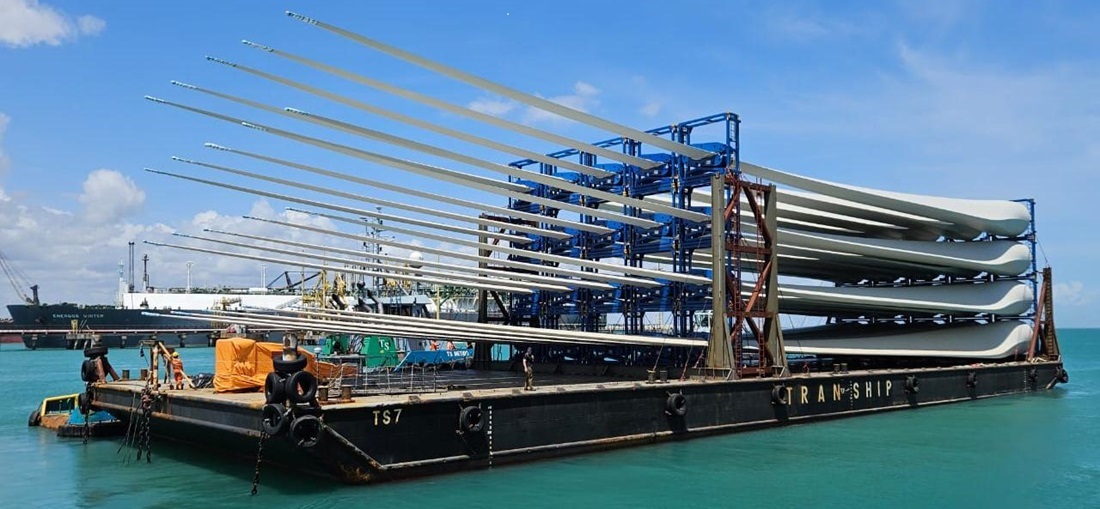
Pecém Port Initiates Game-Changing Wind Turbine Cabotage Transport
Nov, 27, 2023 Posted by Gabriel MalheirosWeek 202344
In a cutting-edge operation in Brazil, the Pecém Port shipped 20 wind turbine blades on an ocean barge bound for the Port of Rio Grande in Rio Grande do Sul. A total of nine similar operations are planned, with dates yet to be announced, transporting a total of 200 blades. This marked the first time such equipment was loaded and transported on a barge with a tugboat in the country (a transport method previously only done in Europe).
Manufactured by Aeris, the blades took about 20 days to reach their destination in southern Brazil. Before that, it took two weeks for the components to arrive at Pecém. The loading procedures took place between October 5 and 6, and the cargo reached its destination in the city of Santana do Livramento (bordering Uruguay) at the beginning of November.
The freight service between ports in the same country, known as cabotage, currently represents 70% of all container movement at Pecém. Considering all terminal transportation services, cabotage represents around 30%.
André Magalhães, the commercial director of the Pecém Complex, exclusively provided these details to Diário do Nordeste. “We are one of the ports in Brazil with the most availability for maritime cabotage services. We have seven lines departing from Pecém to the North and South of Brazil; we are practically a hub for cabotage, connecting the Brazilian coast with international ships. Pecém is currently the largest port in Brazil in terms of connection capacity.”
Regarding the transport of the blades, André notes that loading them onto barges towed by smaller ships is unprecedented and a landmark for the Brazilian sector. He commented that cost savings and logistics efficiency, where 20 components can be transported simultaneously, are fundamental for advancing logistics.
The director also points out that, when it comes to road transportation, each blade would need to be carried by a truck, and it would still require escorts and comply with a series of rules to “cross” Brazil and reach its destination.
“From a thousand kilometers distance, maritime transport becomes less costly. In this case, we are talking about much simpler logistics, where a group of equipment is loaded all at once, relieving road congestion and causing less pollution.”
The first batch of blades traveled on a T7S barge, with a tug making two stops for maintenance along the approximately 4,500-kilometer journey, or more than 2,000 nautical miles. “Most ocean barge operations in Brazil are focused on the oil and gas and agricultural sectors. This operation is groundbreaking, a watershed moment, and will serve as a model for others.”
To capitalize on the action and make it even more profitable, the port is seeking cargoes to ship from Rio Grande to Pecém, ensuring the barge “does not return empty.”
Source: Diário do Nordeste
Click here to read the original article: https://diariodonordeste.verdesmares.com.br/negocios/porto-do-pecem-embarca-pas-eolicas-em-balsa-para-rio-grande-do-sul-acao-barateia-custo-de-logistica-1.3447223
-
Coffee
Jul, 30, 2019
0
Brazilian coffee quality suffers due to climate
-
Shipping
Apr, 04, 2019
0
China Navigation Company buys Hamburg Süd’s dry bulk business
-
Ports and Terminals
Sep, 26, 2019
0
Port of Itajaí and Ponta da Madeira TUP lead ANTAQ’s Environmental Ranking
-
Grains
Dec, 20, 2022
0
Argentina: wheat shipments line-up down to 526,562 k tonnes in December


